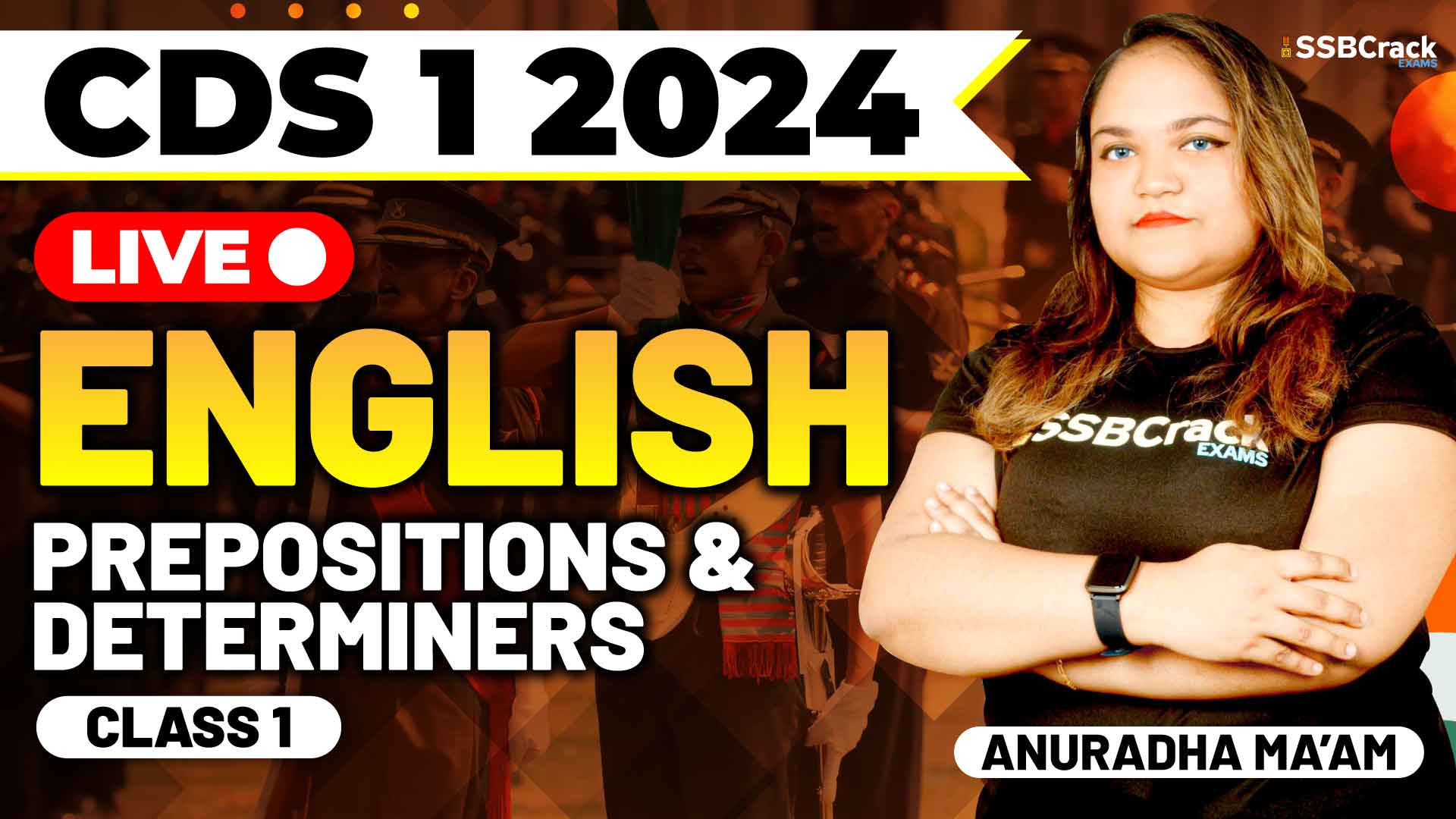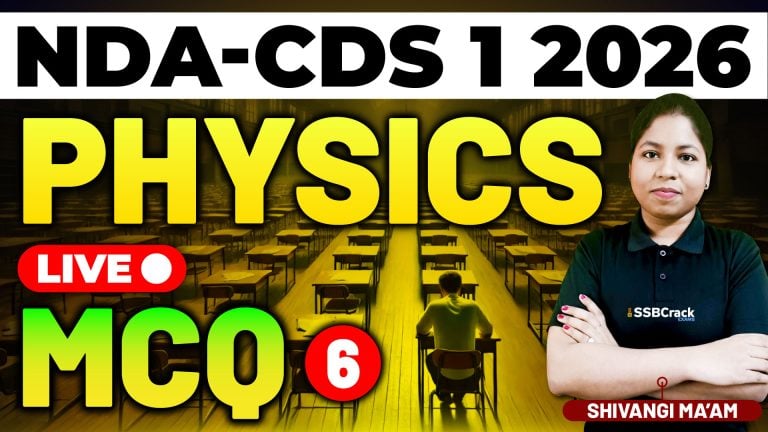The Combined Defence Services (CDS) examination is a challenging test that seeks to identify individuals with the potential to serve in the prestigious armed forces. Within the English section of the examination, a nuanced understanding of grammar is crucial, and among the key elements are Prepositions & Determiners. This article aims to highlight the importance of mastering Prepositions & Determiners, focusing on their rules and usages in English sentences, particularly in the Fill in the Blanks format.
Q) Don’t look directly at _____ sun.
(a) a
(b) an
(c) the
(d) on
Ans. (c)
Q) The dogs were _____ given a bone.
(a) each
(b) any
(c) every
(d) anybody
Ans. (a)
Q) He went with __________ younger sisters.
(a) His both
(b) Both his
(c) Two his
(d) both
Ans. (b)
Q) I always keep _____ money in my wallet for emergencies.
(a) any
(b) one
(c) some
(d) none
Ans. (c)
Q) I’d rather be single ________ in a bad relationship.
(a) besides
(b) instead
(c) than
(d) of
Ans. (c)
Q) Using your cell phone while driving is ___________ the law.
(a) against
(b) beyond
(c) spite
(d) on
Ans. (a)
Q) After payment, you’ll receive the product __________ 10 business days
(a) during
(b) inside
(c) within
(d) for
Ans. (c)
Q) I have no experience, so I’m _____ a disadvantage when it comes to this job interview.
(a) at
(b) in
(c) with
(d) on
Ans. (a)
Q) I read a great book ______ Khalid.
(a) by
(b) in
(c) of
(d) on
Ans. (a)
Q) My grandparents lived in that same house _____ ages.
(a) in
(b) for
(c) within
(d) during
Ans. (b)
For more questions, check out CDS 1 2024 Exam English Live – Prepositions & Determiners – Class 1
- The Fundamental Role of Prepositions: (a) Spatial Relationships: Prepositions play a vital role in expressing spatial relationships, helping convey where or when an action takes place. For example, “The soldiers are training _the field,” where the correct preposition might be “in” or “on” depending on the context. (b) Direction and Movement: Prepositions assist in indicating direction and movement, crucial for military communication. Phrases like “The platoon marched _ the mountain pass” underscore the importance of selecting the correct preposition to convey accurate information. (c) Temporal Relationships: Expressing temporal relationships is another vital function of prepositions. In sentences like “The briefing is scheduled _ 0800 hours,” the preposition “at” is essential for precision.
- Navigating Determiners for Clarity: (a) Definite and Indefinite Articles: Determiners, particularly articles (a, an, the), play a pivotal role in specifying or generalizing nouns. For instance, understanding when to use “a” instead of “an” or when to omit an article altogether contributes to clarity in communication. (b) Demonstratives: Determiners like “this,” “that,” “these,” and “those” help in pointing out specific items or groups. Knowing when to use these determiners enhances the accuracy of descriptions. (c) Quantifiers: Determiners such as “some,” “many,” “few,” and “several” assist in quantifying nouns. Proper usage of these determiners is essential in conveying accurate information. (d) Possessives: Determiners indicate possession, and understanding when to use “my,” “your,” “his,” “her,” “its,” “our,” or “their” ensures precise communication about ownership or affiliation.
- Rules and Usages of Prepositions & Determiners in English Sentences: (a) Avoiding Redundancy: One key rule is to avoid redundancy in prepositions. For instance, saying “He is stationed at at the base” is incorrect; it should be “He is stationed at the base.” (b) Choosing the Correct Preposition: The correct choice of prepositions is crucial for conveying accurate spatial or temporal relationships. Knowing whether to use “in,” “on,” “at,” or other prepositions depends on the specific context. (c) Selecting Appropriate Determiners: Determiners contribute to specificity and precision. Choosing the appropriate article or determiner for a given noun ensures clarity in the message being conveyed.
- Importance of Prepositions & Determiners in CDS Examination: (a) Communication Precision: In military contexts, precision in communication is non-negotiable. Mastery of prepositions and determiners ensures that officers can convey information with clarity and accuracy. (b) Fill in the Blanks Format: The Fill in the Blanks format in CDS often tests candidates’ understanding of prepositions and determiners. Proper usage in this format is crucial for securing points in the English section. (c) Effective Military Writing: Whether writing reports, mission briefings, or tactical plans, officers must use prepositions and determiners effectively to ensure that information is conveyed comprehensively and unambiguously.
- Strategies for Mastering Prepositions & Determiners: (a) Thorough Study of Rules: Aspirants should invest time in understanding the rules governing prepositions and determiners, including their specific usages. (b) Practice with Contextual Exercises: Regularly practicing sentences and exercises that involve prepositions and determiners in different contexts reinforces correct usage. (c) Active Reading of Military Literature: Actively reading military literature exposes aspirants to correct preposition and determiner usage in relevant contexts. (d) Feedback and Revision: Seeking feedback from peers or instructors on written exercises contributes to improvement, and regular revision helps in retaining learned rules.
Conclusion:
In conclusion, a solid grasp of prepositions and determiners is indispensable for CDS aspirants aiming for success in the English section of the examination. By understanding the rules governing their usage and practicing in various contexts, aspirants can strengthen their linguistic skills. Mastery of prepositions and determiners not only ensures success in the CDS examination but also prepares candidates for effective communication in the dynamic and challenging environments inherent to a career in the armed forces.







